Search Results
Mark Foley
BART Police hosts Trunk or Treat at North Berkeley station on 10/29/24 from 4pm to 7pm
A spooky vibe is coming to the North Berkeley station!
The BART Police Department will be hosting its annual Trunk or Treat Halloween event there Tuesday October 29 from 4 pm to 7pm. There will be games, prizes, pumpkin decorating, music, and more ghoulish delights!
Children are invited to wear their Halloween costumes, but costumes are not mandatory. Kids will get to collect candy and non-candy treats, play games and win prizes.
The event is open to children under the age of 12 and entrance is free. Children must be accompanied by an adult.
*This article was originally posted on Oct 2, 2024.
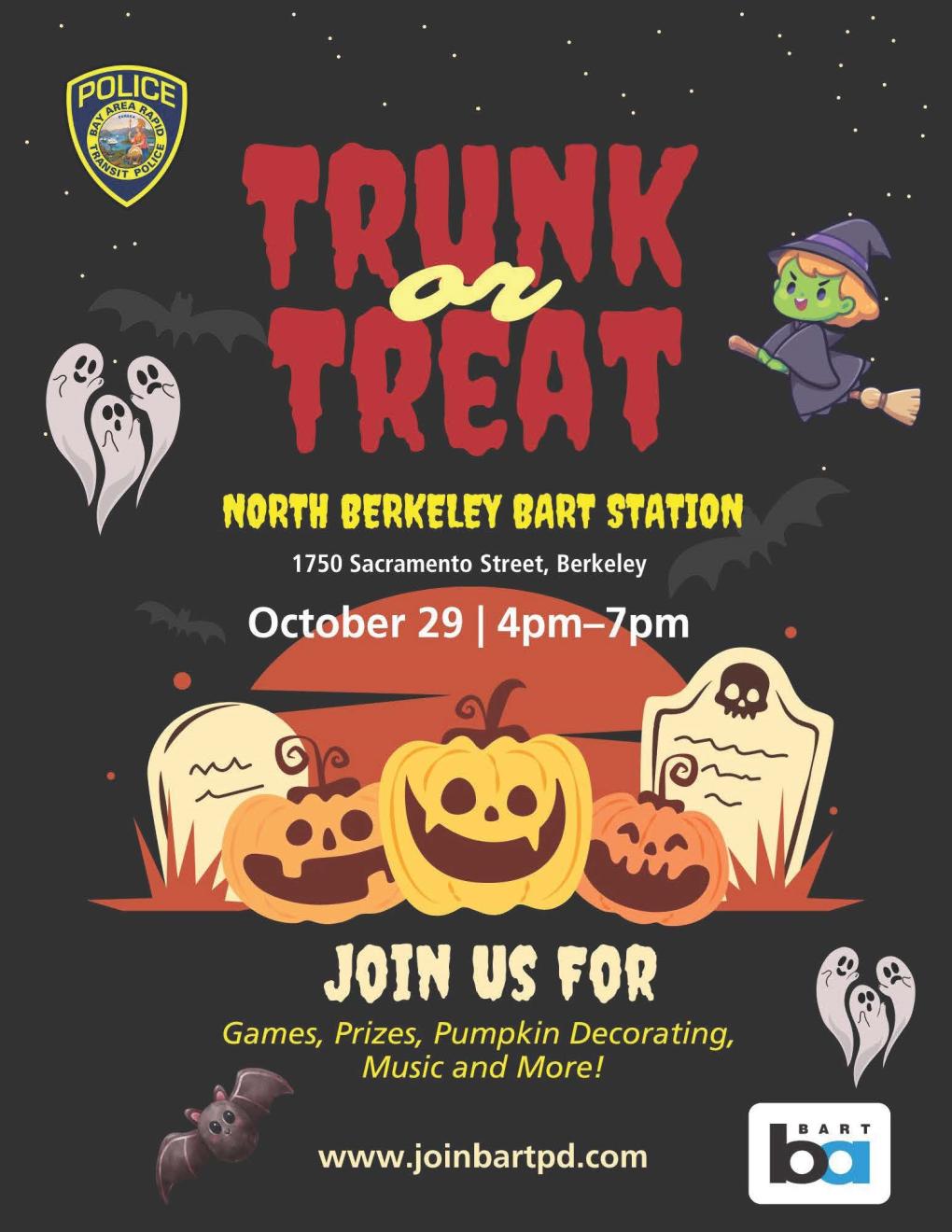
BART Train Operator Dewayne Deams on the lessons he learned from his great-grandfather, transit trailblazer Curtis E. Green
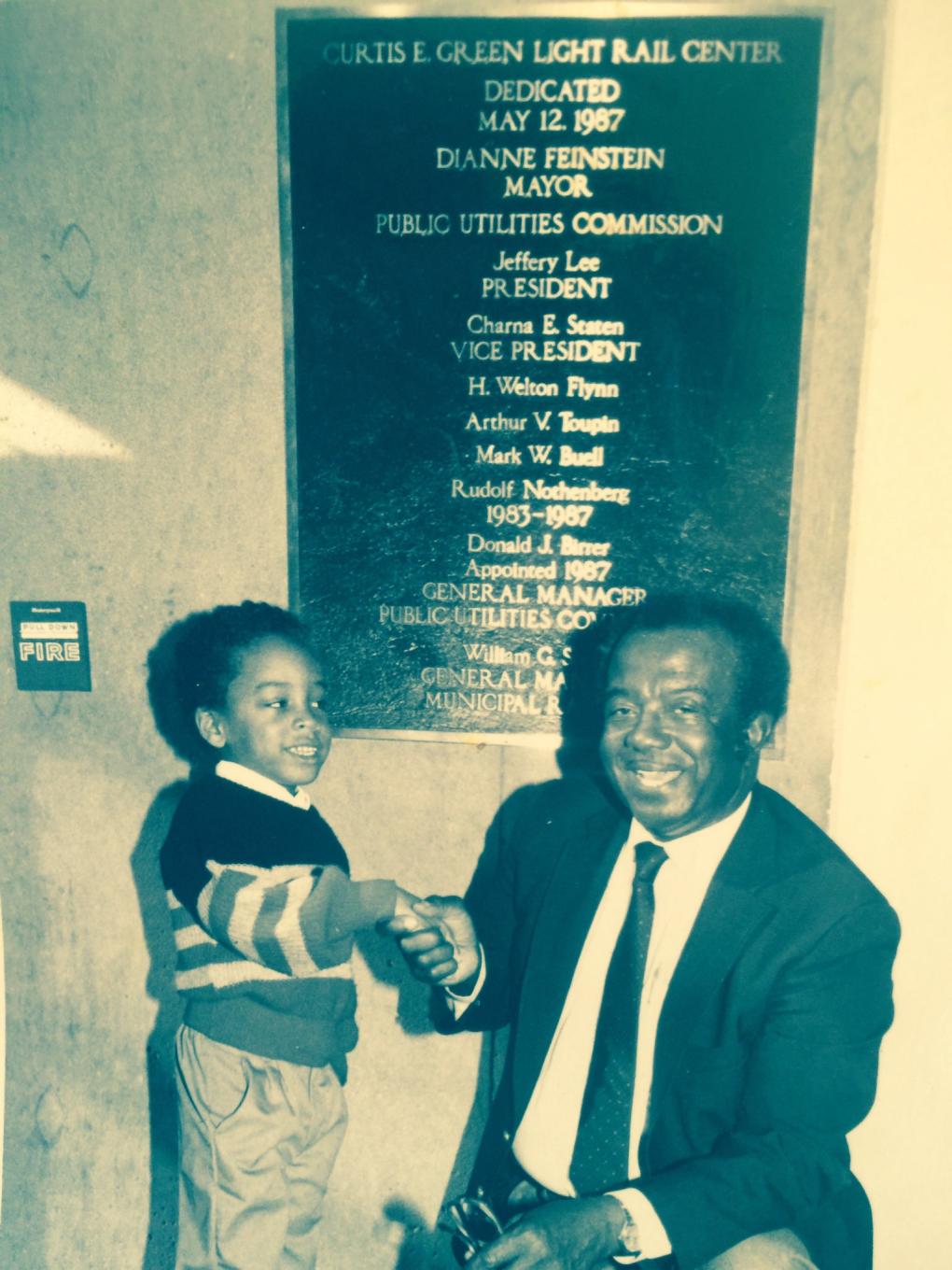
Dewayne Deams (left) with his great-grandfather Curtis E. Green at the dedication ceremony for the Curtis E. Green Light Rail Center on May 12, 1987. Photo courtesy of SFMTA Photo | SFMTA.com/Photo
BART Train Operator Dewayne Deams has digital version of an old photo stashed on his phone. The grainy, sepia-toned image shows a boy, smiling and shaking hands with a gentleman in a suit and tie. There's a plaque behind them that reads: “Curtis E. Green Light Rail Center, Dedicated May 12, 1987."
The boy is Deams as a five-year-old. The gentleman is Curtis E. Green, Deams’ great-grandfather and the first Black person to lead a big-city transit agency in the U.S. Green’s impact on public transportation is immeasurable. For Deams, its personal.
“I don’t have a vocabulary big enough to describe how much his legacy means to me,” Deams said of his great-grandfather. “He’s a trailblazer. In my time with him, I never saw him that way. I didn’t realize he's literally in the history books until I was older.”
Deams started asking questions about the man he knew simply as “granddaddy” after his funeral, at which Willie Brown spoke and a letter by Dianne Feinstein was read. Green died in 2002 at 78 after a long illness. Deams, then 21, had seen Brown and Feinstein on tv. He knew they were famous, but why were they speaking at great-grandpa’s memorial service?
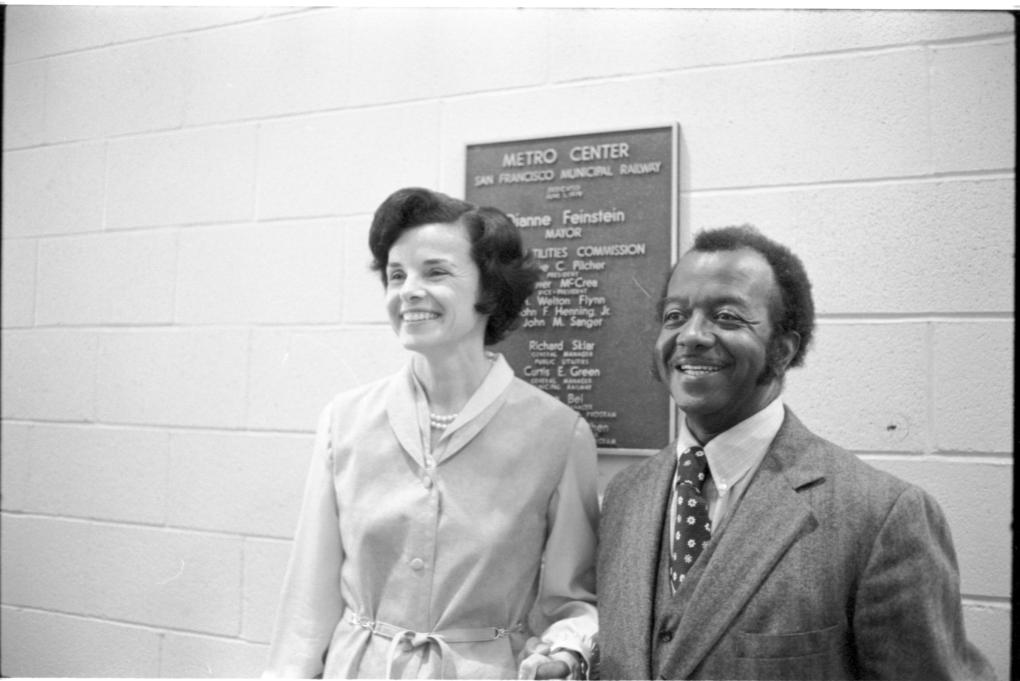
Dianne Feinstein, then the Mayor of San Francisco, and Curtis E. Green at the dedication of the Muni Metro Light Rail System on July 11, 1979. Photo courtesy of SFMTA Photo | SFMTA.com/Photo
Deams said his great-grandfather wasn’t the name-dropping type, and he certainly didn’t know him as “the Muni guy.” Rather, he remembers Green as gregarious and easygoing with a hearty laugh. The two talked about football a lot.
After Green died, Deams started researching, and he quickly came to realize his great-granddaddy was a “big deal.” At the African American Museum and Library at Oakland, Deams found a section all about Green and his legacy.
“I had him for a good while,” Deams said. “But when you’re a kid, you don’t always understand the magnitude of things. It’s like, okay, grandpa, whatever you say. I’m grateful I eventually came to learn the importance of what he accomplished.”
Before he fully understood his great-grandfather’s legacy, Deams said he would sometimes brag to friends and classmates when passing the Curtis E. Green Light Rail Center in Balboa Park.
“I’d say, ‘Look at that name! That’s my grandfather,’” Deams remembers. “That was always a claim to fame for me.”
Transit obviously runs in Deams’ blood, and not only on behalf his great-grandfather. Both of Deams' parents drove buses and light rail for Muni. His mother, Denise Green, is now a supervisor at the agency, where she’s worked for more than 30 years. Twice she’s won the distinguished Driver of the Month award, including when she worked in Green’s namesake division. He attended every one of her awards ceremonies.
“The second time she won, while she was working in the Green Division, he came and spoke about how proud he was,” Deams said. “I get choked up thinking about it. That was one of the last times I saw him before he died.”
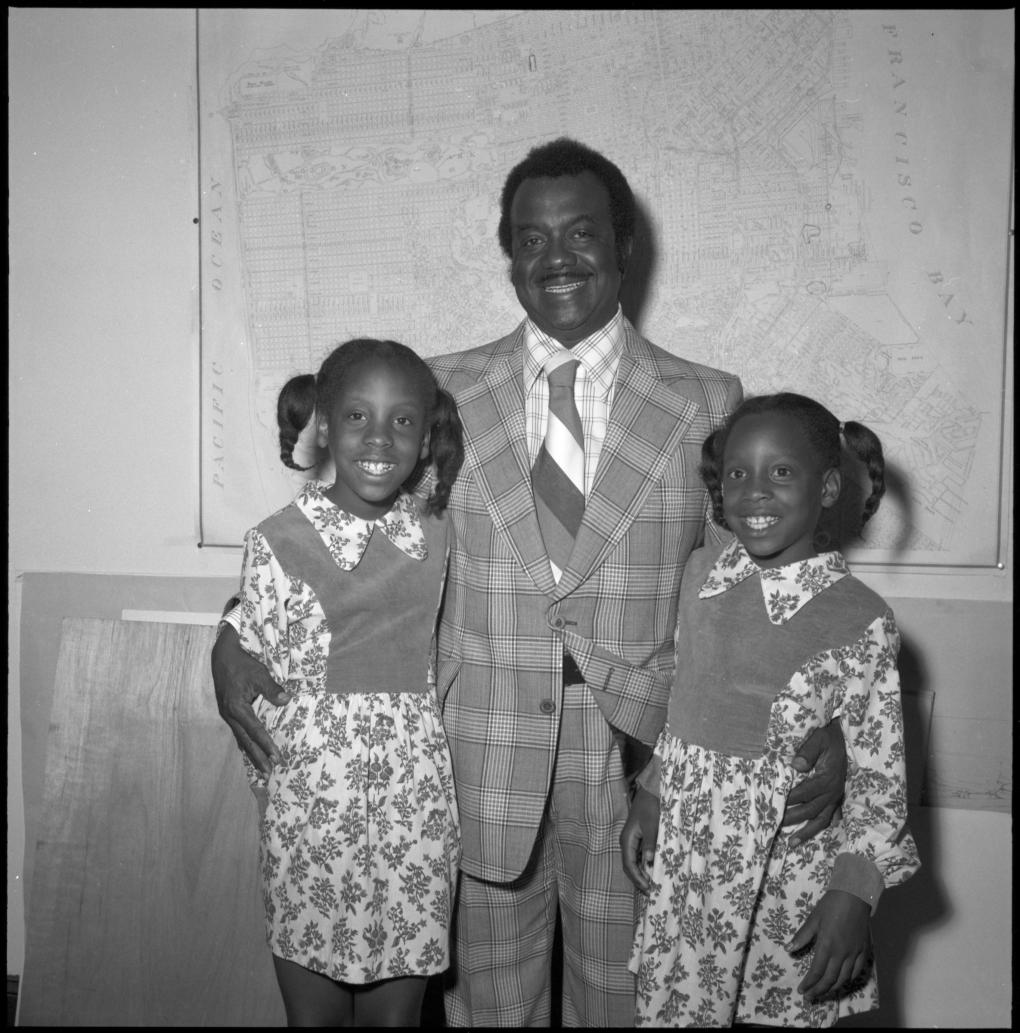
Curtis E. Green pictured with his family on July 23, 1974. Photo courtesy of SFMTA Photo | SFMTA.com/Photo
Green settled in San Francisco after serving in the Marines during WWII. Before the war, it could be challenging to find a job if you were Black -- hiring practices were often blatantly discriminatory. The war opened things up a bit, and in 1945, when Green was seeking a job in San Francisco, many employers suddenly had a shortage of workers on their hands. That year, Green was hired as a bus driver, making 90 cents an hour.
Over his 37-year career at Muni, Green slowly rose in the ranks. He knew he wanted to pursue management, and so he did, earning his degree after years of night classes. In 1974, he became deputy general manager of Muni. A year later, he was promoted to the top spot.
Things were not always easy for Green, his great-grandson said. Back in the day, drivers carried change – riders didn’t have to give exact fare – which sometimes made them targets. Green was once robbed and beat up for his change purse.
He faced challenges because of his race, too, especially as he moved up in the ranks. “’You’re affirmative action. You’re only getting this because they needed to hire a Black guy,’” Deams said, parroting colleagues’ racist remarks. Those words stung his great-grandfather, Deams said, but he always rose above it, touting the importance of hard work above all else.
Green loved his job, the city, working with people, Deams said. When he reached the top of Muni's ranks, he treated everyone the same, whether a janitor or mayor of San Francisco.
Deams carries on his great-grandfather’s legacy in his own way, waking up each morning, hopping in his cab, and striving to give BART riders the best service possible. He describes himself as “a major transit nerd” -- one of the lucky few whose passion is also his job.
Deams said his conduct at work is influenced by his great-grandfather and the example he set. Green believed in killing ‘em with kindness and told his great-grandson that there was nothing wrong with being nice. Deams took that to heart, applying it in scenarios as basic as “seeing someone running to the train doors when I’m operating.”
“I could just take off, but I’m a sucker and hold the doors most of the time,” he said. “People appreciate it. You don’t have to be cutthroat. You can be kind and still get the job done.”
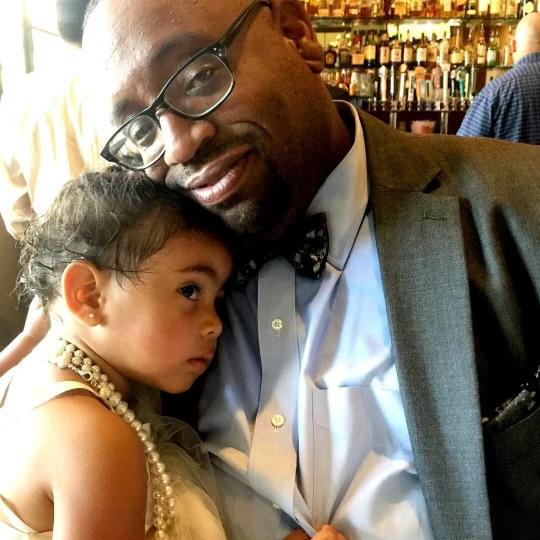
A recent photo of Dewayne Deams with his daughter.
One of his favorite parts of the job, like his great-grandfather, is interacting with people. Deams currently works on the Yellow Line, and he loves “walking the platform to my train, answering questions as I go, and seeing people ride from all over the world.” Typical topics of conversation include baseball and how to get to Fisherman’s Wharf. Once, Deams met a woman boarding the train with her father, who had helped build BART back in the 1960s. Deams was honored to take them for a ride.
Having grown up as a “latchkey kid” in the Bayview District of San Francisco, Deams said public transit was a lifeline for him and his little brother. They took it to school, to baseball practice, to appointments. His favorite spot to take the train growing up was Blondie’s Pizza at Powell Street Station. He and his friends would grab a slice and try to scarf it down before the pigeons beat them to it.
As a teenager one evening, while spending the night at his grandmother’s house, Deams remembered convincing her to give him a $20 bill. He grabbed the cash, took the bus to Colma Station, and rode BART to the Coliseum to watch a Warriors game.
“For $20 at the time – it was the 90s – I was able to get there and back, buy a ticket to the game, and get some nachos,” he said. “My mom was pretty furious when I got back though.”
Now, Deams takes his three daughters around the Bay Area on BART, including to sports games. They’re proud of their dad and his career. BART trains aren’t just BART trains to them, Deams said, but Daddy’s BART trains. Just like his great-grandfather did for him so many years before, Deams is now sharing the joys of transit with his children, teaching them how to use it and why it matters.
“They’re in love with trains,” he said. “Especially BART trains.” Nothing could make him prouder.
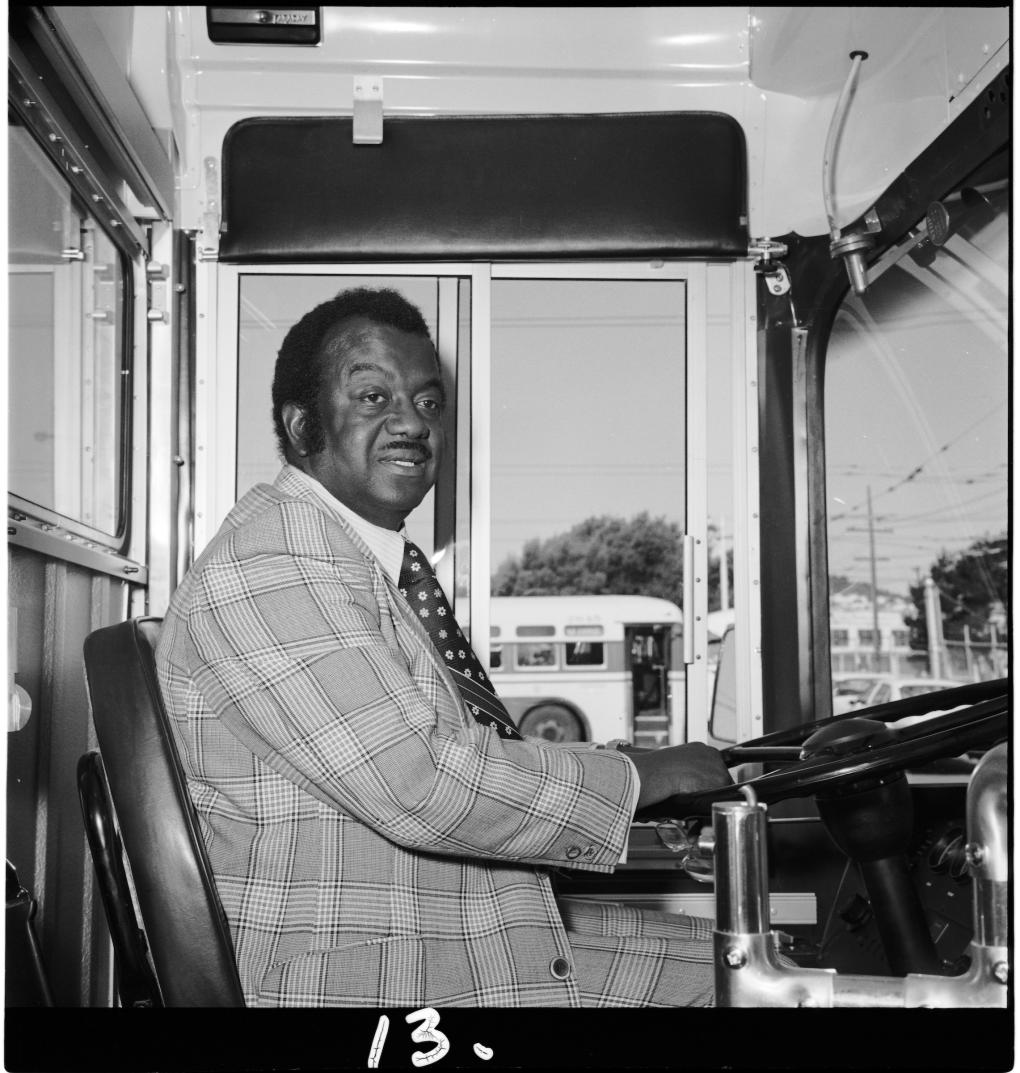
Curtis E. Green at the wheel of a new AM General diesel coach on May 5, 1975. Photo courtesy of SFMTA Photo | SFMTA.com/Photo
West Oakland
Pride Month 2024: BART’s Terri Hodges on saying what she feels, meaning what she says, and bringing a dash of weird to the workplace
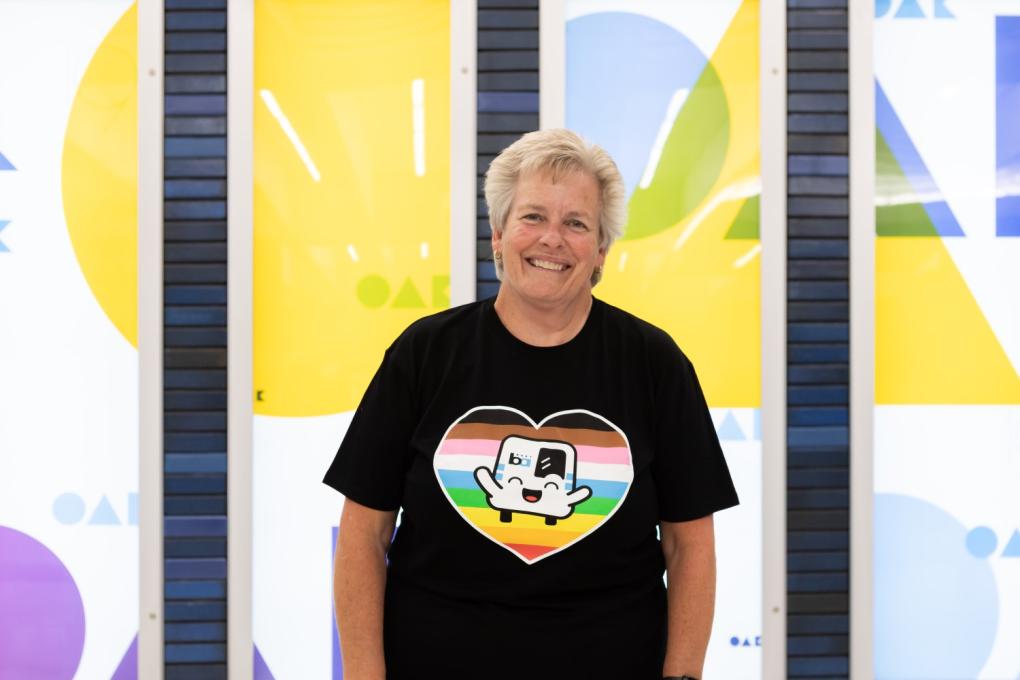
Happy Pride Month from all of us at BART!
BART gets very into the Pride spirit every year. Throughout the month, we'll be publishing more stories, walking in the San Francisco Pride Parade with the BARTmobile, and releasing new Pride merch.
Speaking of merch...
BART's new 2024 Pride Tees are now listed for sale on Railgoods.com.
Terri is modeling the t-shirt above. More merch coming soon.
Read about the history of BART's iconic Pride merch here.
“I am large, I contain multitudes,” wrote the 19th-century queer poet Walt Whitman in his celebrated poem, Song of Myself.
The famous line could not be more relevant when talking about Terri Hodges, BART’s Director of Risk and Insurance Management.
She’s a multitudinous woman: a partner, dog mom, “insurance geek,” high-ranking manager, and an exceptional pool party hostess for her “gaybors” (gay + neighbors = gaybors). Add to the list: BART’s Director of Risk and Insurance Management.
The “song of herself” she returns to each Pride Month is Born This Way by Lady Gaga “because it’s not just inclusive of gay people, but so many others.” And to Terri, inclusivity and intersectionality are what Pride Month is all about.
“The thing is, people think Pride Month is one month where everyone’s great to each other and celebratory,” she said. “But for me and my partner, it’s not just a month. That’s just how we live our life.”
Besides her famous pool parties, Terri doesn’t do much out of the ordinary to celebrate Pride Month.
“I celebrate my gayness by doing all the things people who aren’t gay do,” she said. “I love my house, I love my girl, I love my dog. I just celebrate people. It’s not about being gay or not gay, it’s about being a good person.”
As you can imagine, Terri’s kindness-first approach makes her a much-loved manager at BART, where she’s worked for 29 years. One of her longtime colleagues, Liability Risk Analyst Steve Shatz, called Terri “a flexitarian: somebody who does what it takes to accommodate their employees.”
A photo from one of Terri and Patti’s ”gaybor” pool parties during Pride Month.
Terri and Steve have worked together for nearly three decades. When they are not referring to each other as husband and wife – “I’ve known Terri longer than my real wife. There isn’t really anything about me that she doesn’t know,” Steve said – they call each other “Scabby.” It’s a long story for another article, but it’s illustrative of something key to Terri’s workplace disposition. The best kind of work relationship, she said, is one in which you can be honest and fun (and trust that everyone gets their work done). The other members of the Risk and Insurance Management team, Matt Goltaio and Tesia Bell, have nicknames, too. Sometimes they call each other hybrids of their real names – just to keep the jovial camaraderie in play.
“We kid with one another and have a very breezy relationship, while still being very professional,” Terri said of the close-knit team.
The playful, inclusive environment at BART is quite different from the atmosphere at the insurance companies Terri worked for early in her career. Before coming to BART, Terri experienced frequent discriminatory behavior – things like people asking her if she was “really gay” or acting inappropriately at company functions.
The Bay Area has long been a trailblazer in advocating and securing equal rights for all. But when Terri was growing up in Concord, she said “the mindset was different” than it is now.
"When I was younger, it was either you’re gay or you’re straight. There was no in between. Even bisexuality was considered way out of the norm,” she said. Stringent categorization didn’t exactly work for Terri. She's someone who likes existing within the liminal spaces of human experience.
“When I was younger, it wasn’t that I wasn’t secure with my sexuality, but I was very fluid in it,” she said. “I wasn’t always just gay. I’ve come out and gone back in. I’ve always liked people for who they are, not necessarily because of their gender.”
A recent photo of Patti (left) and Terri (right).
Growing up, Terri was fortunate to always feel safe and supported in her sexuality. She doesn't really have a “coming out story,” she said. The coming out just happened naturally.
“When I first realized I liked women, I was in high school. My parents were like you have a boyfriend, though. And I was like, I want a girlfriend, too,” she said. “My parents didn't totally get it, but they said, if that makes you happy, that makes you happy. I feel so grateful to have that support system because I know many don’t.”
That early encouragement had a lasting impact on Terri and her character.
“What I bring to the table is inclusivity and understanding that not everyone has had the opportunity to be treated equally,” she said. “I hope to bring a level of kindness and understanding to people who have not always been given that luxury because of who they are, what their status is.”
She continued: “Everyone deserves to be treated with kindness and love. Not always respect, though. You have to earn that!”
Terri has the right demeanor for the work she does. Balancing compassion with professionalism is crucial in her field. At face value, the group “is the least sexy department at BART,” Terri said. But there's more to it than meets the eye. The department thoroughly researches every claim that comes to BART guided by goals of fairness and protection of taxpayers and riders who fund BART.
“Claim settlements come from taxpayer money,” Terri said. “I’m a taxpayer myself, and it is my fiduciary duty to make certain that if we owe it, we pay it, and if we don’t owe it, we don’t pay it.” For a time, she admits she was known as “Hell No Hodges.”
One must strike a balance between BART’s fiduciary duty while thoughtfully holding space for the complicated emotions a person or family experiences after a crime or tragedy. BART is public, and anything can happen on public property. But as Terri says, “Just because it happened on BART doesn’t mean its our responsibility.”
“We’re not an insurer of the public, we can’t afford to be,” Terri explained. “But we do have an obligation to approach each claim with kindness.”
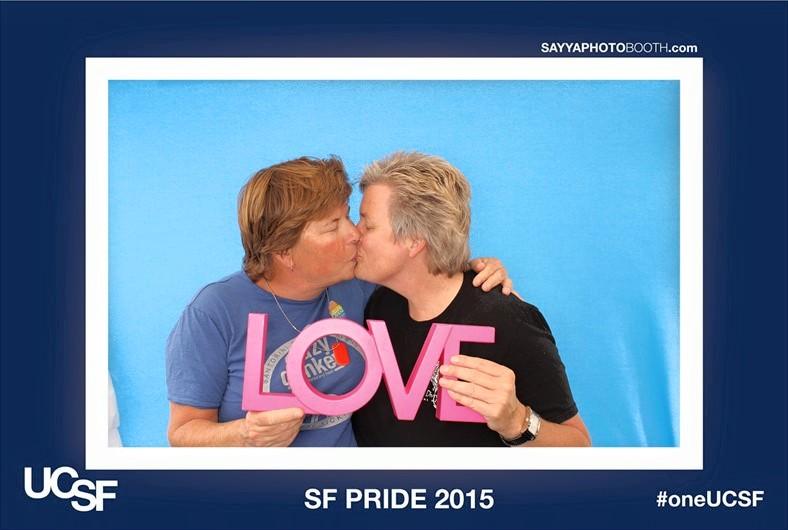
Patti and Terri at SF Pride 2015.
The emotionally taxing work is made easier by the warm, accepting environment that has held sway at BART since Terri started working there almost three decades ago.
“I have had the best experience at BART. I have never been an outcast for my sexuality. Everyone is unbelievably inclusive, and every manager has supported and advocated for me,” Terri said. “BART goes hard with Pride. We have the swag, the parade, the celebrations for employees. But we don't just celebrate Pride; we celebrate all diverse communities. And that’s not just because BART has to. There is a genuine warmth here. People can be who they are.”
Terri is a woman of multitudes, but also contradictions. As an insurance professional, she is by default “risk averse" (“risk” is literally in her job title). But multiple times a year, Terri and her partner, Patti, go diving. Their dive trips have taken them from Hawaii to Belize, Mexico to Australia.
“I’m risk averse yet I’m doing one of the riskiest things ever,” Terri laughed, admitting she usually swims down just about 50 feet, where she can still see the surface. She leaves the deep-sea thing to Patti.
And soon, the couple will have a lot more time to dive. Terri plans to retire next year. She's already mentally preparing for the milestone that she knows will “be hard and sad.”
“This is the place that has allowed me to grow both professionally and personally into the person I am,” Terri said. And that person is one who “says what I feel, means what I say, and tries to be as solid of a human as I can be – but sometimes in a weird way.”
Berryessa / North San Jose
Downtown Berkeley
“Our systems are more aligned now than ever”: Local transit CEOs take BART, buses, and even an electric trolley during Earth Day ride-along event
Ride-along attendees and transit riders fill a County Connection Route 14 bus. On Friday, April 21, ten transit CEOs from across the Bay Area gathered for a multimodal, three-hour-long voyage that carried them from the green hills of Orinda to the dry heat of Pittsburg. The “All Aboard with Transit CEOs”
Robert Raburn
Win big prizes, including a $250 Clipper card, when you download BART’s Digital Holiday Passport and explore places and adventures near stations
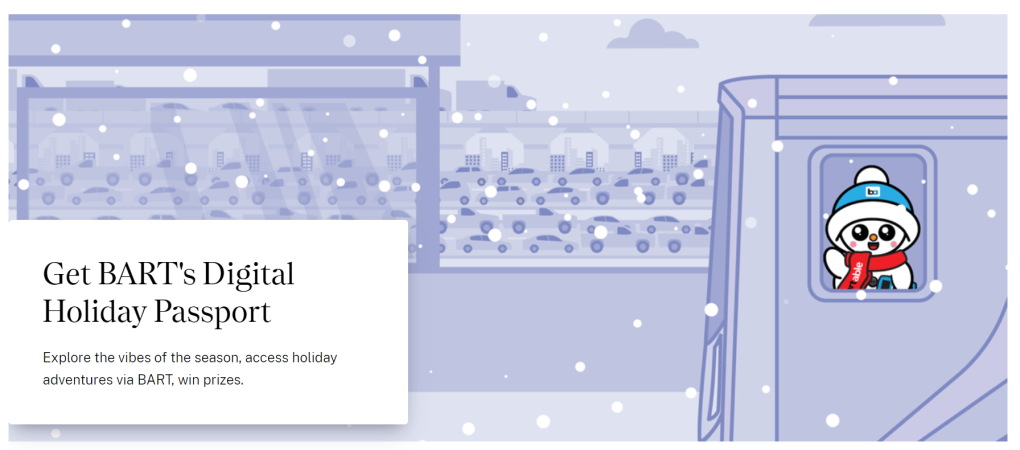
On Thursday, Dec. 7, BART launched a Digital Holiday Passport to encourage riding BART to explore the region and access holiday fun and adventures. Participants can win big prizes, including a $250 Clipper card and a 2023 Ugly Holiday Sweater and Holiday Beanie.
BART created the Digital Holiday Passport in partnership with Vibemap, a city discovery app that uses “vibes” to connect users to places, events, and experiences. Vibemap will join BART at SweaterFest ‘23 on Sunday, Dec. 10, 2pm to 3pm, at Rockridge Station, to promote the challenge and answer questions. Members of the public who attend SweaterFest ‘23 will also be the first to receive the brand-new BART Stamp Passports for the BART Stamp Rally.
The Digital Holiday Passport challenge will run from Thursday, Dec. 7, 2023, to Monday, Jan. 1, 2024. Seven stations will serve as check-in locations:
- Downtown Berkeley
- Fruitvale
- Montgomery
- MacArthur
- Lake Merritt
- West Dublin/Pleasanton
- Walnut Creek
To participate, download Vibemap on the iOS App Store or the Google Play Store. After downloading, travel within 0.5 miles of one of the seven stations listed above, and you’ll receive a notification to unlock the Digital Holiday Passport. The passport is geofenced so you can’t participate unless you’re physically in the area.
Participants will earn “Challenge Points” for every nearby activity they do – from checking-in at stations and places around BART, to adding “vibes” and tips to the app. The more points you have, the higher your chances of winning prizes, such as:
- $250 Clipper card
- 2023 Ugly Holiday Sweater (Size Large), Holiday Beanie
- $50 Clipper card
- $11 Clipper cards + BART swag bag
After the challenge concludes, Vibemap will host an IRL event for participants to meet and mingle. Date and location TBD. At the event, you can get a special holiday stamp as part of the BART Stamp Rally.
To learn more about the Digital BART Holiday Passport visit bartable.bart.gov/vibemap.